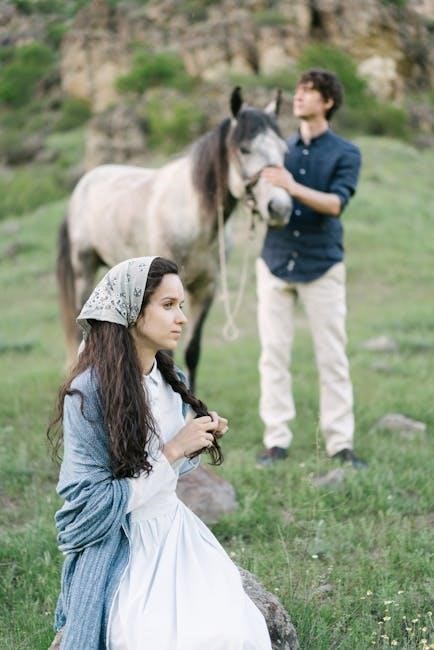D․H․ Lawrence’s timeless short story‚ “The Rocking Horse Winner‚” explores themes of luck‚ greed‚ and family dynamics․ Available as a free PDF download‚ it captivates readers with its supernatural elements and tragic undertones․
Overview of the Short Story
“The Rocking Horse Winner” by D․H․ Lawrence is a captivating short story that delves into themes of luck‚ greed‚ and family dynamics․ It follows the life of Paul‚ a young boy who becomes obsessed with a rocking horse‚ believing it holds the key to predicting winning racehorses․ The story explores the supernatural and tragic elements as Paul’s obsession grows‚ leading to a devastating conclusion․ Available for download in PDF‚ ePUB‚ and MOBI formats‚ this classic tale offers a haunting reflection on the consequences of chasing material wealth and the fragile bond between a mother and her son․
Biography of D․H․ Lawrence
D․H․ Lawrence‚ born David Herbert Lawrence in 1885 in Nottinghamshire‚ England‚ was a renowned novelist‚ poet‚ and short story writer․ His works often explored themes of human nature‚ emotions‚ and societal norms․ Lawrence’s upbringing in a coal-mining family deeply influenced his writing․ He gained fame for novels like “Sons and Lovers” and “Lady Chatterley’s Lover․” His short story “The Rocking Horse Winner” reflects his ability to weave magical realism with psychological depth․ Lawrence’s legacy endures as a significant figure in 20th-century literature‚ with his works remaining widely read and studied․ His life ended in 1930‚ but his impact continues to resonate․
Historical Context of the Story
“The Rocking Horse Winner” by D․H․ Lawrence is set in the early 20th century‚ reflecting the societal pressures and financial struggles of the time․ The story captures the tension between desire and reality‚ echoing the post-World War I era’s economic challenges․ Lawrence’s portrayal of a family’s pursuit of wealth and the supernatural elements highlights the human condition’s fragility․ The historical context underscores themes of greed‚ luck‚ and the emotional toll of materialism‚ resonating with readers facing similar societal pressures․ The story remains a powerful commentary on human nature and its struggles․

Plot Summary
The story revolves around Paul‚ a young boy who believes his rocking horse can predict race winners‚ driving his obsessive quest for luck and wealth․
Paul‚ a young boy‚ is the central character of “The Rocking Horse Winner․” He is driven by an obsessive belief that his wooden rocking horse can reveal the winners of horse races․ Paul’s quest for luck and wealth stems from his family’s financial struggles and his mother’s unfulfilled desires․ His determination and supernatural connection to the horse set him apart‚ leading to both triumph and tragedy․ Paul’s story explores themes of obsession‚ fate‚ and the blurred lines between reality and fantasy‚ making him a compelling and tragic figure in D․H; Lawrence’s narrative․
The Role of the Rocking Horse
The rocking horse serves as both a literal and symbolic element in the story‚ representing Paul’s obsession with luck and his supernatural ability to predict race outcomes․ Through his rides‚ Paul believes the horse reveals winning horses‚ fueling his quest to alleviate his family’s financial struggles․ The horse becomes a medium for Paul’s connection to an unseen world‚ symbolizing his fragile grip on reality․ Its presence drives the plot’s tragic progression‚ highlighting themes of obsession‚ greed‚ and the destructive power of chasing luck․ The rocking horse is central to Paul’s identity and the story’s eerie‚ magical realism․
The Family’s Financial Struggles
The family in “The Rocking Horse Winner” grapples with persistent financial difficulties‚ despite their middle-class status․ The mother‚ once beautiful and privileged‚ now feels burdened by her inability to maintain the lifestyle she desires․ Her marriage‚ initially for love‚ has turned sour‚ leaving her with a sense of failure․ The family’s income is insufficient‚ and their expenses often exceed their means‚ creating a cycle of debt and dissatisfaction․ Paul’s obsession with the rocking horse stems from his desire to alleviate his family’s financial woes‚ highlighting the emotional toll of their struggles and the mother’s unspoken resentment․ This financial strain drives the story’s tragic momentum․
Paul’s Obsession with Luck
Paul’s fixation on luck emerges as a central theme in “The Rocking Horse Winner․” Believing he can predict horse races through his rocking horse‚ Paul becomes consumed by this notion․ His quest for luck is both a desperate attempt to solve his family’s financial problems and a reflection of his emotional desire for his mother’s love․ The rocking horse acts as a medium through which Paul seeks control and validation‚ driving him to an obsessive pursuit of success․ This obsession ultimately escalates‚ leading to both triumph and tragedy‚ as Paul’s belief in his luck becomes an all-consuming force in his life․
The Tragic Conclusion
The story reaches its poignant climax as Paul’s relentless pursuit of luck ultimately leads to his downfall․ After predicting a major race win‚ Paul’s health deteriorates drastically due to the strain of his obsession․ His mother‚ oblivious to his condition‚ focuses solely on the newfound wealth․ Paul’s death serves as a devastating conclusion‚ highlighting the destructive nature of greed and the unattainable quest for luck․ The tragedy underscores Lawrence’s critique of materialism and the emotional detachment within families‚ leaving a lasting impact on readers․
Themes in “The Rocking Horse Winner”
D․H․ Lawrence’s “The Rocking Horse Winner” delves into themes of luck‚ greed‚ and family dynamics‚ exploring the destructive nature of materialism and the pursuit of fortune․
The Theme of Luck and Fate

The theme of luck and fate in “The Rocking Horse Winner” revolves around Paul’s belief that he can predict race outcomes through his rocking horse․ His conviction drives his actions‚ blurring the line between chance and destiny․ Lawrence portrays luck as both a source of hope and a destructive force‚ leading Paul to an unavoidable tragic end․ This theme highlights the human desire to control fate‚ often resulting in devastating consequences․ The story critiques the obsession with luck‚ emphasizing its role in shaping Paul’s destiny and the family’s downfall․ Lawrence’s exploration of luck and fate remains a central focus‚ illustrating the darker aspects of chasing fortune․
Greed and Materialism
Greed and materialism are central to “The Rocking Horse Winner‚” as Paul’s family struggles with financial instability․ His mother’s insatiable desire for wealth drives Paul to seek luck through his rocking horse‚ hoping to alleviate their financial burdens․ However‚ this pursuit of material comfort leads to moral decay and emotional detachment․ Lawrence portrays greed as a destructive force‚ consuming the family and ultimately contributing to their downfall․ The story serves as a critique of societal values‚ emphasizing the consequences of prioritizing wealth over emotional well-being․ This theme remains a poignant commentary on the dangers of materialism and greed․
Mother-Son Relationship Dynamics
The relationship between Paul and his mother is complex and emotionally charged․ Paul seeks to gain his mother’s love and approval through his ability to predict race winners‚ filling the void left by her emotional distance․ However‚ her fixation on material wealth overshadows their bond‚ leading to a toxic dynamic․ Paul’s efforts to please her only intensify his obsession with luck‚ while she remains detached‚ unaware of the toll her actions take on her son․ This strained relationship underscores the theme of emotional neglect and its consequences‚ highlighting the tragedy of unmet needs and misplaced priorities in their lives․
The Supernatural Element
The story features a supernatural element through Paul’s rocking horse‚ which seemingly predicts race winners․ This magical realism drives the plot‚ as Paul believes the horse possesses mystical powers․ The horse’s ability to guide him to victories creates a sense of enchantment and foreboding․ This element highlights the blurred lines between reality and fantasy‚ emphasizing Paul’s obsession and the tragic consequences of his belief․ The supernatural aspect underscores the story’s themes of obsession‚ fate‚ and the unsettling forces that shape human lives‚ adding depth to the narrative’s psychological and emotional layers․

Symbolism and Imagery
The rocking horse symbolizes Paul’s quest for luck and escape from his family’s financial struggles․ Its rhythmic motion mirrors his emotional turmoil‚ while the house embodies their suffocating reality․
The Rocking Horse as a Symbol
The rocking horse in D․H․ Lawrence’s “The Rocking Horse Winner” is a profound symbol of Paul’s obsession with luck and his desperate attempt to secure financial stability for his family․ It represents both hope and tragedy‚ as Paul believes the horse possesses supernatural abilities to predict race winners․ The horse’s rhythmic motion mirrors Paul’s emotional turmoil‚ while its silence and inanimate nature contrast with his vivid‚ almost magical connection to it․ Through the horse‚ Lawrence explores themes of greed‚ materialism‚ and the destructive pursuit of wealth‚ ultimately highlighting the devastating consequences of Paul’s actions․
The Color Red and Its Significance

The color red in “The Rocking Horse Winner” holds deep symbolic meaning‚ often associated with passion‚ greed‚ and impending doom․ It appears in the glowing eyes of the rocking horse‚ signifying Paul’s intense‚ almost supernatural connection to the horse and his obsession with luck․ Red also symbolizes the family’s financial struggles and the mother’s insatiable desire for wealth․ Lawrence uses red to create a sense of tension and foreboding‚ foreshadowing the tragic events that unfold․ The recurring imagery of red underscores the destructive nature of materialism and the devastating consequences of Paul’s quest for luck․
The Representation of the House
The house in “The Rocking Horse Winner” serves as a central symbol‚ embodying the family’s financial instability and emotional dysfunction․ It is described as always whispering the phrase “There must be more money‚” reflecting the mother’s constant anxiety about wealth; The house represents a prison of greed‚ where love is overshadowed by material desires․ Its oppressive atmosphere mirrors the family’s internal turmoil‚ with each room symbolizing unfulfilled aspirations․ The house‚ therefore‚ becomes a character in its own right‚ exacerbating the tragic events and highlighting the destructive power of materialism in Lawrence’s narrative․

Character Analysis
The story delves into complex characters‚ focusing on Paul’s obsession with luck and his mother’s greed․ The uncle and gardener play pivotal roles‚ shaping the tragic outcome․
Paul: The Central Character
Paul‚ the young protagonist‚ is a sensitive and determined boy driven by a belief in his supernatural ability to predict horse race winners․ His obsession with luck stems from his family’s financial struggles and his mother’s unfulfilled desires․ Through his rocking horse‚ Paul seeks to gain the luck he believes his family lacks‚ leading to both triumph and tragedy․ His character represents the devastating consequences of chasing material wealth and the fragility of childhood innocence in a world dominated by greed and misfortune․
The Mother: Her Role and Motivations
The mother‚ a central figure in Paul’s life‚ is portrayed as a complex‚ emotionally distant character․ Her financial dissatisfaction and unmet aspirations drive her actions‚ creating tension within the family․ Despite her beauty and initial advantages‚ she feels unlucky‚ particularly in her marriage․ Her relationship with Paul is strained‚ as she struggles to connect with him emotionally․ Her constant pursuit of material comfort indirectly fuels Paul’s obsession with luck‚ leading to tragic consequences that highlight the destructive power of unfulfilled desires and the absence of emotional support in their dysfunctional household․
The Uncle: Influence and Impact
The uncle plays a pivotal role in Paul’s life‚ introducing him to the world of horse racing and betting․ His influence sparks Paul’s belief in luck and his ability to predict race outcomes․ The uncle’s interactions with Paul are limited but impactful‚ offering both encouragement and financial support․ However‚ his involvement also perpetuates Paul’s obsession‚ contributing to the story’s tragic trajectory․ The uncle’s presence highlights the external pressures that exacerbate the family’s financial struggles‚ ultimately shaping Paul’s destiny and the devastating events that unfold․
The Gardener: A Supporting Figure
The gardener serves as a minor yet significant figure in Paul’s life‚ offering a glimpse into the family’s social dynamics․ His presence underscores the class distinctions within the household‚ as he represents the working-class staff․ The gardener’s interactions with Paul are minimal but notable‚ often involving tasks that highlight the family’s economic struggles․ His role‚ though secondary‚ contributes to the overall atmosphere of the story‚ emphasizing the isolation and tension within the home․ The gardener’s subtle presence helps to illustrate the broader societal context of the narrative‚ adding depth to the characters’ experiences․
Adaptations and Interpretations
The story has been adapted into films‚ including a 1949 version‚ and an opera by Gareth Williams․ Modern stage productions offer fresh perspectives on Paul’s journey and family dynamics․

Film Adaptations of the Story
The Rocking-Horse Winner has been adapted into several films‚ including a 1949 version and a 1950 adaptation by director Anthony Pelissier․ These films capture the story’s eerie atmosphere and tragic elements․ The 1950 film‚ in particular‚ is noted for its faithful interpretation of Lawrence’s narrative‚ blending magical realism with social commentary․ Modern adaptations continue to explore the story’s themes‚ ensuring its relevance for new audiences․ The story’s enduring appeal lies in its ability to transcend time‚ making it a timeless classic in both literature and cinema․
The Rocking Horse Winner Opera
The Rocking-Horse Winner has been transformed into an opera by composer Gareth Williams and librettist Anna Chatterton․ This adaptation maintains the story’s dark‚ dramatic essence‚ blending magical realism with lyrical minimalism․ The opera focuses on the intense relationship between Paul and his mother‚ exploring themes of obsession and tragedy․ Its intimate and powerful portrayal brings Lawrence’s story to life through music‚ offering a unique and haunting experience for audiences․ This operatic interpretation highlights the timeless appeal of the narrative‚ making it accessible to new generations of art lovers․
Modern Stage Productions
Modern stage productions of “The Rocking Horse Winner” offer fresh interpretations of D․H․ Lawrence’s classic tale․ One notable adaptation reimagines Paul as a young man with autism‚ emphasizing his emotional detachment and unique connection to the rocking horse․ These productions often blend traditional theater with multimedia elements‚ creating a haunting atmosphere that underscores the story’s themes of obsession and tragedy․ By exploring contemporary issues‚ such as mental health and familial dysfunction‚ these adaptations ensure the story’s relevance to modern audiences while staying true to its original emotional intensity and moral complexity․

Literary Style and Technique
D․H․ Lawrence’s “The Rocking Horse Winner” masterfully blends magical realism with sharp social commentary‚ creating a haunting atmosphere that explores themes of obsession and supernatural insight․
Lawrence’s Use of Magical Realism
D․H․ Lawrence masterfully employs magical realism in “The Rocking Horse Winner‚” blending the ordinary with the supernatural․ Paul’s ability to predict race outcomes through his rocking horse creates a haunting tension․ This technique allows Lawrence to explore deeper psychological and societal themes‚ such as greed and family dysfunction‚ while maintaining a sense of mystique․ The fusion of reality and fantasy heightens the story’s emotional impact‚ making the tragic conclusion both inevitable and profound․ Lawrence’s use of magical realism underscores the darker aspects of human nature and the elusive nature of luck․ His style captivates readers with its unique blend of the mundane and the extraordinary․
Narrative Structure and Pacing
D․H․ Lawrence’s “The Rocking Horse Winner” features a tightly wound narrative structure that builds tension through its pacing․ The story begins with Paul’s obsession with luck and escalates steadily‚ maintaining a suspenseful rhythm․ Lawrence’s use of short‚ impactful chapters creates a sense of inevitability‚ drawing readers toward the tragic conclusion․ The pacing mirrors Paul’s growing desperation‚ intensifying the emotional weight of his quest for luck․ This narrative approach ensures that the story’s themes of greed and fate are conveyed with clarity and force‚ leaving a lasting impression on readers․
Themes of Tragedy and Irony
D․H․ Lawrence masterfully weaves themes of tragedy and irony in “The Rocking Horse Winner․” Paul’s relentless pursuit of luck leads to his ultimate downfall‚ highlighting the destructive nature of obsession․ The story’s tragic ending underscores the futility of chasing material wealth‚ while the irony lies in Paul’s mother benefiting from his demise․ These elements create a poignant commentary on societal values‚ leaving readers reflecting on the consequences of greed and the elusive nature of true happiness․ Lawrence’s exploration of these themes adds depth and complexity to the narrative․
Download and Reading Options
“The Rocking Horse Winner” is available as a free PDF download in multiple formats‚ including ePUB and MOBI‚ ensuring easy access for readers worldwide․
How to Download the PDF
Downloading “The Rocking Horse Winner” in PDF format is straightforward․ Visit a reliable website like archive․org or manybooks․net‚ search for the title‚ and select the PDF option․ Ensure the source is trusted to avoid malware․ Some platforms offer free downloads without sign-up‚ while others may require simple registration․ Once downloaded‚ the file can be read on any device with a PDF reader․ Always verify the file’s integrity and check for updates to ensure the best reading experience․
Available Formats: PDF‚ ePUB‚ MOBI
“The Rocking Horse Winner” is accessible in multiple formats‚ catering to various reading preferences․ The PDF version preserves the original layout and is ideal for desktop reading․ ePUB and MOBI formats offer flexibility for e-readers and mobile devices‚ ensuring readability on Kindle‚ tablets‚ and smartphones․ These formats are widely available on platforms like ManyBooks and Project Gutenberg‚ allowing readers to choose their preferred option for a seamless experience․ This versatility makes Lawrence’s classic story easily accessible to a broad audience․
Free Access and Legal Downloads
D․H․ Lawrence’s “The Rocking Horse Winner” is widely available for free download in PDF‚ ePUB‚ and MOBI formats․ As a classic work‚ it is in the public domain‚ allowing legal downloads without copyright restrictions․ Readers can access the story from reputable platforms like ManyBooks or Project Gutenberg without needing to sign up․ This ensures easy and lawful access to the story‚ enabling readers to explore its themes of luck‚ greed‚ and family dynamics․ The free availability of the story in multiple formats makes it accessible to a global audience‚ preserving its literary significance for future generations․

Study Guides and Analysis
Downloadable PDF guides offer in-depth analysis of “The Rocking Horse Winner‚” including summaries‚ critical insights‚ and essay prompts․ These resources aid students in understanding the story’s themes and symbolism․
“The Rocking Horse Winner” by D․H․ Lawrence is a poignant tale of a young boy‚ Paul‚ who believes his rocking horse can predict race winners․ The story explores themes of greed‚ luck‚ and the strained relationship between Paul and his mother․ Lawrence uses magical realism to weave a tragic narrative‚ highlighting the destructive nature of materialism․ Critics praise the story’s emotional depth and its critique of societal values․ The PDF version offers readers a convenient way to analyze the text‚ with summaries and critical essays providing deeper insights into its psychological and symbolic layers․
Study Questions and Discussion Topics
How does the rocking horse symbolize Paul’s quest for luck and control?
What role does greed play in the family’s dynamics?
Analyze the mother-son relationship and its impact on Paul’s actions․
How does Lawrence use the supernatural to convey themes?
What does the story reveal about the consequences of obsession?
Discuss the significance of the story’s tragic ending․
How does Lawrence’s style contribute to the narrative’s tension?
What moral or social commentary does the story offer?
These questions encourage deeper exploration of the story’s themes and symbolism‚ fostering meaningful discussions and analyses․
Essay Ideas and Writing Prompts
Explore how Paul’s obsession with luck reflects societal pressures on success․
Analyze the symbolism of the rocking horse and its connection to Paul’s fate․
Discuss the psychological impact of the mother’s emotional detachment on Paul․
How does the story critique materialism and greed?
Examine the role of the supernatural in conveying moral lessons․
Write about the tragic irony in Paul’s ultimate sacrifice․
Compare Paul’s relationship with his mother to his bond with the rocking horse․
How does Lawrence’s use of magical realism enhance the narrative?
What message does the story convey about the pursuit of wealth?
Discuss the ethical implications of exploiting a child’s “luck” for financial gain․
Reception and Reviews
The Rocking Horse Winner PDF remains a popular download‚ praised for its emotional depth and critique of greed․ Readers find its tragic themes hauntingly relevant․
Reader Responses and Feedback
Readers have consistently praised “The Rocking Horse Winner” for its emotional depth and thought-provoking themes․ Many find the story hauntingly relatable‚ exploring greed‚ luck‚ and family dynamics․ The supernatural elements and tragic ending leave a lasting impression․ Fans appreciate how Lawrence’s vivid imagery and psychological insight create a compelling narrative․ The story’s ability to evoke strong emotions and spark discussions has made it a favorite among readers․ Its timeless themes resonate across generations‚ making it a must-read for both casual and academic audiences․
Critical Reception and Reviews
Critics have widely acclaimed “The Rocking Horse Winner” as a masterful blend of magical realism and social commentary․ Reviewers praise Lawrence’s ability to weave a tale that is both haunting and profound․ The story’s exploration of greed‚ family dysfunction‚ and the supernatural has been lauded for its depth and complexity․ Many have noted its tragic undertones and the emotional impact of Paul’s journey․ The narrative structure and Lawrence’s vivid prose have been particularly highlighted‚ cementing the story’s place as a literary classic․ Its enduring relevance continues to inspire new adaptations and interpretations․
Modern Interpretations and Relevance

Modern interpretations of “The Rocking Horse Winner” highlight its timeless themes of greed‚ family dynamics‚ and the pursuit of luck․ The story’s exploration of a young boy’s obsession with winning resonates in today’s society‚ where materialism and financial pressures remain prevalent․ Recent adaptations‚ including stage productions and operas‚ have reimagined the narrative for contemporary audiences․ The story’s supernatural elements and psychological depth continue to captivate readers‚ making it a relevant and thought-provoking work in modern literary discourse․ Its enduring appeal lies in its universal themes and haunting portrayal of human frailty․
